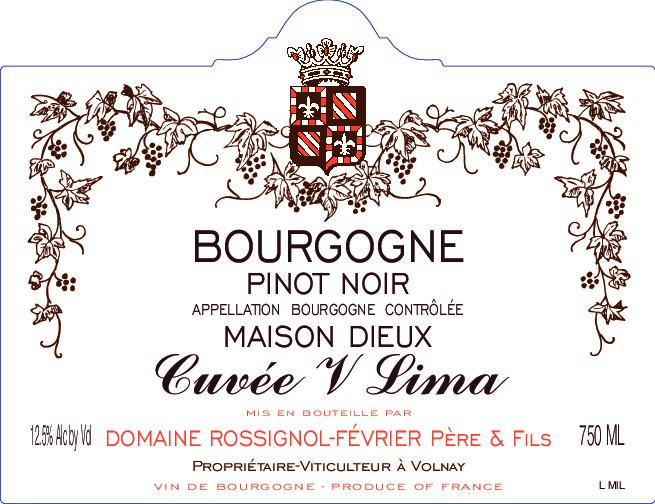Domaine Rossignol-Février
The Estate
Since 1920, Domaine Rossignol-Fevrier has been estate-bottling the wines produced from their family vineyards. Five generations have cultivated their parcels in the center of the Cote de Beaune, with vineyards in Meursault, Volnay, Pommard, and Beaune. Today Frederic Rossignol farms 7.5 hectares biodynamically, with Demeter certification since 2009.
Vineyards are planted with a density of 10,000 vines per hectare, with an average age of the vines a robust 40 years old. Selection of plant material is from the best existing vines, a selection massale for replanting vines when they need to be replaced due to age or disease. Cultivation is carefully biodynamic, with the soil worked regularly using special preparations to enhance plant vigor and prevent cryptogamic diseases.
Yields average 35 to 40 hectoliters per hectare, and each vine is limited to around eight bunches of grapes for even spacing on the vine. This assures complete ripening of the bunches, as well as a precise reflection of the characteristics of each particular terroir. Unfortunately, hailstorms in the central Cote de Beaune villages from 2011 through 2014, and frost in 2016 has severely limited the production and availability of the Domaine.
The harvest occurs over a 4 to 8 day period depending on the vintage, and the quantities of grapes on the vine. All of the 20 to 25 pickers are long-time regulars, often clients and customers, and they return nearly every year for the camaraderie, excellent meals, and the final fete de vendange harvest party. The experience of the pickers means that only healthy grapes are harvested, with damaged fruit left in the vineyard, and a final triage of what is picked is done on a vibrating table before the grapes go into vats for fermentation.
White grapes in whole clusters are pressed in a pneumatic press before being chilled for debourbage (settling of the gross lees) in temperature-controlled stainless steel tanks for 24 hours. After settling in tank, the must is drained into standard Burgundy barrels of 228 liters (25 cases of 12x750ml). Barrels are a combination of new (maximum 20%) and previously-used wood, up to 5 year old barriques. Fermentation proceeds slowly in their cold cellars, and malolactic fermentation usually proceeds by the spring following the harvest. The wines are bottled before the next harvest, after racking and assemblage one month prior to bottling. Sulfur dioxide is added minimally; no more than 5cl per barrel for stabilization of the wines against bacterial spoilage. The wines are lightly filtered for clarification.
After selection, the red grapes are mostly destemmed before going into temperature-controlled stainless steel vats for the primary alcoholic fermentation. Depending on the quality of the vintage, a very fine harvest will see some whole clusters added to the vats for structure and complexity in the finished wine. Fermentation proceeds slowly in the cold cellar, and the tannic structure is managed by frequent tastings and occasional pigeage (punching down of the cap of skins and seeds) rather than pumping-over. After the alcoholic fermentations and a total cuvaison of 18 to 24 days (depending on regular tastings), the wines descend into barrels, with an average of 20% new oak, depending upon the appellation, structure of the wine, and quality of the vintage. The skins and seeds are lightly pressed to avoid breaking the seeds and extracting bitter tannins. After malolactic fermentation, the reds are racked and assembled two months prior to bottling. The date of bottling is determined by tasting each barrel regularly, and the wines age in barrel between 10 and 15 months before bottling depending on their maturation. The goal is a fine balance of fruit, acidity, and tannic structure as well as a pure expression of the terroir of each appellation. The red wines are bottled without filtration to preserve their vivacity and energy.
Frederic Rossignol is firmly committed to his organic and biodynamic principals, in spite of the challenges of hail, rot, mildew, and oidium that have severely impacted his yields over the last five years. “one must work in balance with what nature gives us each vintage”, he says, adding “letting each lieu-dit (vineyard site) express its unique character in each vintage is the true pleasure of my work.”
[wpgmza id=”26″]
Wine List
- Wines coming soon
Climat
Outside of the selection of Volnay vines, there are two villages wines from Pommard including Petits Noizons, Beaune Les Chardonnereux, Bourgogne Chardonnay, Bourgogne Pinot Noir Maison Dieu (near Chateau Pommard), Hautes Côtes de Beaune, Passetoutgrains and Aligoté.





















